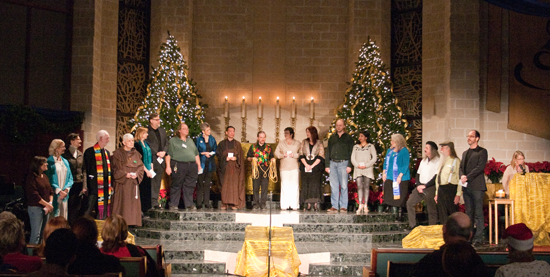Amy at Texas Faith: After the Religious Right, will the Religious Left reassert itself with focus on economic justice?

TEXAS FAITH: After the Religious Right, will the Religious Left reassert itself with focus on economic justice?
The recent history of religious activism in our politics has been largely about the Christian right. Robust new churches and growing congregations are part of the success story of conservatives who have focused on social and family issues. At the same time, something else has happened. Young Americans today are less affiliated religiously than any time in our history. Fully one-third of Americans under 30 are unaffiliated with a formal religious group, according to Public Religion Research Institute. One in five 18- to 29-year-olds say that religion is not important in their lives, compared to only 10 percent of those 50 and older who say that.
A new report from the Brookings Institution suggests there is an opportunity at the moment for the Religious Left to reassert itself. How? By a concerted focus on economic justice.
The report, “Faith in Equality: Economic Justice and the Future of Religious Progressives,” outlines big challenges for religious political witness: growing secularization, divisions between religious and secular Americans, our polarized politics and a weakened infrastructure for many mainstream churches. According to a Brookings blog post: “The Religious Right spoke to the country’s worries about social change. The religious progressive movement speaks to the country’s desire for economic change. The persistence of poverty, the decline of social mobility and rising inequality all demand new departures in policy and politics. There is wide room for social action but there is no consensus on what form new approaches to poverty, mobility and opportunity should take. “
There’s a counter-view, of course. Mark Tooley of the Institute on Religion and Democracy says “Religious Left dead-end activism” has contributed to problems, not solved them. “The old Religious Left is mostly faded, having helped marginalize the once mainline churches whose elites sustained it. Now liberal religious activism depends on evangelicals falling away from the core of their faith.” Sounds like political polarization.
Recognizing the virtue of helping the poor and promoting equality – which no one disagrees with, at least in principle – is Brookings right? Is the time ripe for an active push for social justice by the Religious Left, including active government involvement, active church engagement? And if so, would that actually stem our growing secularization, help close divisions between religious and secular Americans, and strengthen the weakened infrastructure of liberal churches?
AMY MARTIN, director emeritus, Earth Rhythms; writer, Moonlady Media
Quite a bit of spin doctoring in this question and a painful amount of polarity. Conservative churches are described as “robust” and progressive ones as “mostly faded.“ The “counter-view” presented in the question is not even a counter-view. So let me offer one.
Judaism, often lumped in with the left, was doing quite well last I looked. Enjoying growth spurts are Unitarian Universalists, New Thought spiritual centers and independent urban churches based on the Jesus doctrine of love. Dallas, considered to be so conservative, has largest gay congregation in the world, the largest Unitarian church outside of the northeast, and a large liberal Methodist church that is thriving, to name but a few. And where in this left-right universe are Hindus, Buddhists and pagans?
The lines between church and club have become blurred. In a poll last year, over half said they go to church not for the sermon, but for the music. Weekly services are a social machine that keeps social ties strong, and reinforces opinion both spiritual and political. Lots of folks belong to Team Christian. But how many of them are followers of Jesus? If they were, social justice would be a priority at all conservative churches.
Rather than conflating the social, spiritual and political, the spiritually unaffiliated contingent has split it. They also need social ties strengthening, but through technology they’ve found other ways besides weekly meetings at brick-and-mortar churches. They open source their spiritual education, choosing from a world of influences the ones that they experience most deeply. And as for politics, well, that’s personal.
